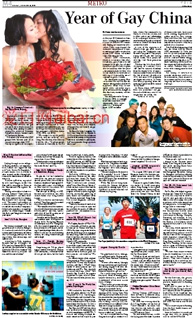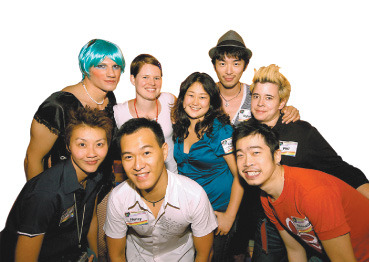The following is an extract of “Year of Gay China” from China Daily. Click on the link below to read the article in full.

As the year 2009 comes to a close, it does so having been a monumental year for China's LGBT community. Beijing and numerous cities across China experienced the successful completion of 12 anniversaries and public events that expose LGBT culture and related issues like never before.
China's LGBT community, which is an acronym that refers to lesbians, gays, bisexuals and transgender people, has adapted the terms tongzhi to refer to gays, lala for lesbians, ku'er for queer - an umbrella term for those who do not identify as heterosexual with regard to sexuality, sexual anatomy or gender identity.
The community is young. Most are in their 20s and 30s, are educated, working professionals with experience abroad who are now highly active and public organizers, authors, editors, designers, film directors, curators, activists and artists.
One catalyst was the Olympic Games in 2008, a landmark event that many in the LGBT community have interpreted as a "coming out" event. LGBT websites have allowed for communities to build, to advertise events, and to allow contact and information to be exchanged between LGBT members from big cities and small towns in China with those from around the world.
As one of the organizers of China's first gay pride events and editor for shanghaiist.com, Kenneth Tan, puts it: "Gay people, young and old, are now coming out en masse. These people are all what I call 'first generation queers'."
Policies, too, have been slowly changing. At a national level, 1997 saw the removal of sodomy from the country's list of crimes; homosexuality was removed from the list of mental disorders in 2001; and since 2003 prominent sexologist and activist, Li Yinhe, has been proposing same-sex marriage legislation at the annual Two Sessions.
In China, where LGBT-themed films are prohibited and gay-themed exhibitions, novels and magazines are taboo, the success of many of these events have been years in the making. Organizers have gotten creative: they arrange other activities; they hold their film festivals and art exhibitions just outside major cities; they keep publicity to a minimum.
So with all this happening, what does the future hold for China's LGBT community? Li Yinhe has revealed plans to propose another same-sex marriage bill in 2010. And in a nation without ratings, perhaps introducing them to TV shows and films, will help lift the ban on gay and lesbian characters on screen. Perhaps China will witness the coming-out of its first celebrity.
Yet among all involved to promote awareness and to end discrimination, there seems to be a consensus: they have come a long way, but there is still a long way to go.

Organisers and participants at Shanghai Pride as featured in China Daily
